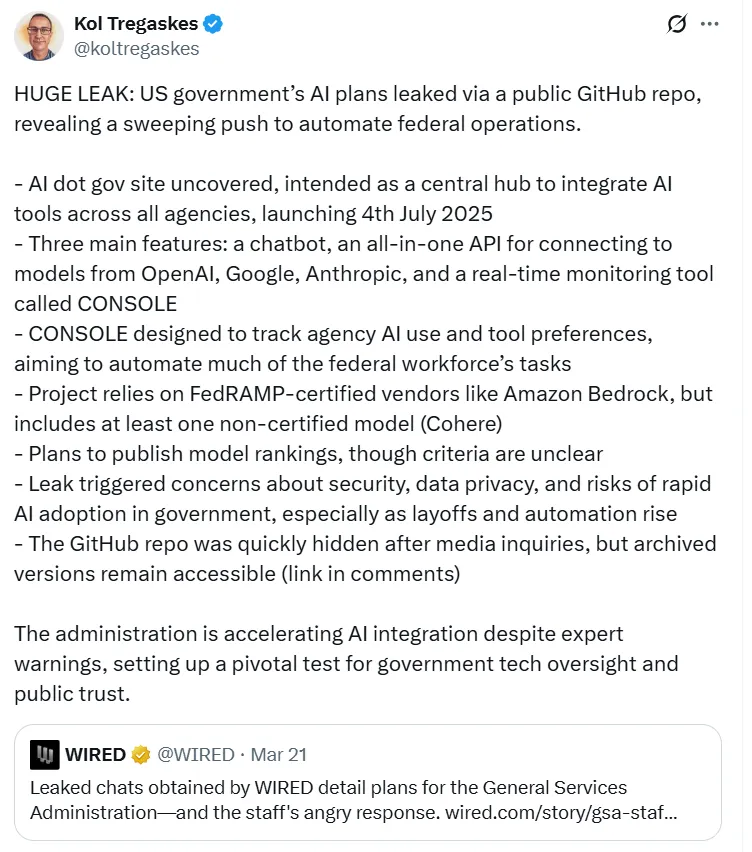Recently, a leaked U.S. government AI plan from a publicly accessible GitHub repository has drawn global attention. This project, codenamed AI.gov, is scheduled to officially launch on July 4, 2025, with the aim of fully automating federal agency operations through artificial intelligence technology. The leaked documents reveal the core functions, potential risks, and underlying controversies of the project. The AIbase editorial team has compiled the latest information to help you gain a deeper understanding of this major event.

AI.gov: Central Hub for Federal AI Integration
According to the leaked content from the GitHub repository, the AI.gov website is positioned as the core platform for integrating AI tools within the U.S. government. Its goal is to "accelerate government innovation through AI." The project is led by the Technology Transformation Services (TTS) department of the General Services Administration (GSA), and it is planned to go live on Independence Day in 2025, July 4. AI.gov will provide all federal agencies with a unified entry point for accessing AI tools, covering various application scenarios from data processing to task automation.
The project head is Thomas Shedd, director of the GSA's Technology Transformation Services Department. He advocates reshaping government operations with an "AI-first" strategy, aiming to transform the GSA into an innovation-driven institution similar to a Silicon Valley startup. However, this ambitious automation plan has also sparked widespread controversy regarding security, privacy, and employment.
Three Core Functions: Chatbot, API, and CONSOLE
The AI.gov platform includes three core functions designed to achieve efficient AI integration across federal agencies:
AI Chatbot: The specific use cases are yet to be clarified but are expected to handle daily operational tasks such as information queries or process automation.
Unified API: Through a single API interface, federal agencies can connect to mainstream AI models like OpenAI, Google, and Anthropic, while plans also include integrating Amazon Bedrock and Meta's LLaMA models. This design aims to reduce the complexity of individual negotiations between agencies and AI suppliers.
CONSOLE Monitoring Tool: CONSOLE is described as a "breakthrough analytics tool" that can monitor the usage of AI tools across agencies in real time, track employee preferences and tool performance, helping managers optimize resource allocation. However, its monitoring capabilities have raised concerns about employee privacy.
Technical Details: FedRAMP Certification and Cohere Controversy
AI.gov's AI models are primarily provided through the Amazon Bedrock platform, with most models already receiving Federal Risk and Authorization Management Program (FedRAMP) certification, meeting government data security standards. However, the leaked documents show that the project includes models from Cohere, which has not yet received FedRAMP certification. This gap has raised questions about the project's security and compliance within the industry.
In addition, AI.gov plans to release a model leaderboard to publicly evaluate the performance of various AI models, but the evaluation criteria have yet to be clarified. Experts worry that the lack of transparent evaluation mechanisms could lead to unfair competition or influence government agencies' selection of AI suppliers.
Security and Privacy Concerns: Risks of Rapid AI Deployment
The leak not only exposed the technical details of AI.gov but also sparked heated discussions about the potential risks of rapid AI deployment. Experts warn that AI systems may face the following issues when handling sensitive government data and personal citizen information:
Data Security Risks: Unreviewed models (such as those from Cohere) without adequate security review may become weak points for data breaches.
Privacy Controversies: The real-time monitoring function of CONSOLE may involve excessive tracking of employee behavior, triggering privacy rights disputes.
AI Bias Issues: In scenarios such as fraud detection, AI decisions may unfairly impact specific groups due to algorithmic bias.
What is more concerning is that while the Trump administration is promoting AI integration, it is simultaneously reducing staff significantly through its "Government Efficiency Department" (DOGE) and plans to replace many federal employees with AI. At the beginning of 2025, the IRS announced the use of AI to fill vacancies left by layoffs, and this trend may further increase employment pressure.
Leakage Aftermath: GitHub Repository Hidden, Controversy Continues to Escalate
After media reports, the GitHub repositories related to AI.gov were quickly hidden, but some archived versions are still accessible online. The leakage incident revealed loopholes in the government's technical management, leading the public to question the transparency and security of AI.gov. Experts believe that the Trump administration's accelerated AI deployment without sufficient regulation and public discussion may pose significant challenges to government technology governance and public trust.
Future Prospects: Opportunities and Challenges of AI.gov
AIbase analysis suggests that the launch of AI.gov marks the U.S. government's ambition in the field of AI applications, but its success depends on whether it can balance innovation and security. If the project can properly address security vulnerabilities, privacy controversies, and transparency issues, it has the potential to become a significant milestone in government modernization. However, the rapid advancement of AI automation may also exacerbate societal concerns about technological unemployment and bring challenges to the relationship between the government and the public.
Conclusion
The accidental leak of the AI.gov plan has unveiled a corner of America's government AI strategy. From chatbots to CONSOLE monitoring tools, AI.gov demonstrates the grand blueprint of comprehensive automation of federal agencies, but its underlying security, privacy, and ethical issues cannot be ignored.



